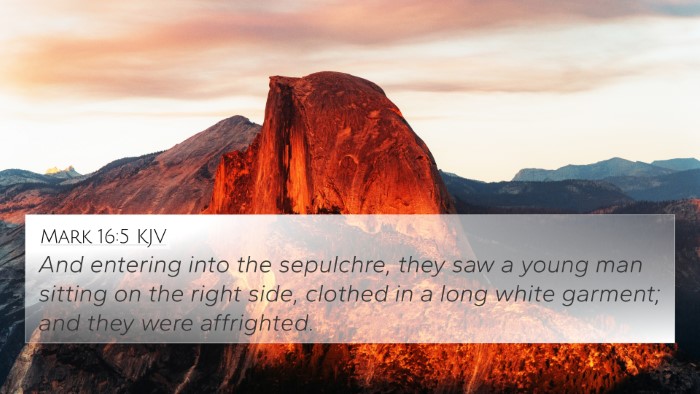Meaning and Interpretation of Mark 9:6
Mark 9:6 states: "For he did not know what to say, for they were greatly afraid." This verse occurs in the context of the transfiguration of Jesus, where He is revealed in His divine glory before three of His disciples, Peter, James, and John. When Moses and Elijah appeared alongside Jesus, Peter’s response reflected a common human reaction to the divine: fear and confusion.
Understanding Mark 9:6
This verse captures a moment of profound awe and trepidation. As noted in public domain commentaries, it illustrates the struggle of discipleship—being in the presence of the holy can evoke complex emotions, including fear. This fear, however, opens a transformative path towards understanding divine authority and the importance of listening to Jesus’ words.
Commentary Insights
- Matthew Henry: Henry emphasizes the gravity of the moment, indicating that Peter’s incapacity to articulate his thoughts underscores human frailty when confronted with the majesty of God. This discomfort leads to a pivotal moment where God directly speaks to the disciples to urge them to listen to Jesus.
- Albert Barnes: Barnes elaborates on the significance of this fear. He indicates that this fear demonstrates the natural response of man in the presence of God’s glory. Barnes points out that while fear can paralyze, it is also a precursor to deeper faith and understanding.
- Adam Clarke: Clarke draws attention to Peter’s impulsiveness, suggesting that even in awe, one must avoid hasty actions or words. Clarke underlines that God’s intervention serves as a corrective measure, urging believers to refocus on Jesus rather than get lost in the spectacle of divine events.
Cross-Referencing Mark 9:6
Thematic Bible verse connections shed light on this verse's meaning. Below are several Bible verses that are interlinked with Mark 9:6, offering a richer understanding through cross-references:
- Exodus 34:29-30: Moses’ face shone after speaking with God, leading others to fear him.
- Luke 9:33: Parallel account of Peter suggesting to build tents for Jesus, Moses, and Elijah amidst his fear.
- Matthew 17:5: God’s voice from the cloud, “This is my beloved Son, in whom I am well pleased; hear ye him.”
- Isaiah 6:5: Isaiah’s reaction to the glory of God, "Woe is me! for I am undone; because I am a man of unclean lips."
- Philippians 2:10-11: Every knee shall bow to Jesus, reflecting His authority and glory.
- Revelation 1:17: John’s fear in the presence of the glorified Christ, mirroring the disciples’ fear.
- Hebrews 12:21: The fear of Moses at Sinai illustrates a reverent response to God’s presence.
- Job 42:5-6: Job’s response to God’s revelation, acknowledging his own limitations.
- Mark 4:41: The fear of the disciples during the storm at sea reflects their struggle to understand Jesus' power and presence.
- John 1:14: "And the Word was made flesh, and dwelt among us, (and we beheld his glory, the glory as of the only begotten of the Father, full of grace and truth.)"
Thematic Analysis and Connections
In exploring the connections between these biblical texts, one can gain insights into how fear, reverence, and the acknowledgment of divine authority interweave throughout the Scriptures. The presence of divine beings, whether God Himself or His prophets, typically incites fear, leading to profound moments of revelation and understanding of God’s purpose.
Conclusion
Mark 9:6 serves as a poignant reminder of the tension between human fear and divine majesty. As believers explore these connections through cross-referencing Biblical texts, they can better understand the significance of Jesus’ identity and mission. By examining related verses and themes, one can develop deeper insights into their own relationship with the divine and the transformative power of faith.
Tools for Further Study
For those interested in exploring Bible cross-references further, consider utilizing the following tools:
- Bible concordances, which provide a comprehensive list of scripture passages related to specific words or themes.
- Cross-reference Bible study guides that help navigate connections between verses.
- Online resources and applications designed to enhance biblical studies through linking scriptures.
Final Thoughts
Engaging with the Bible involves not merely reading verses but delving into their meanings, exploring cross-references and seeking thematic connections. Through the insights gained from Mark 9:6 and its related verses, believers can enrich their understanding of God's revelation and their role within it. This process encourages a deeper dialogue with the texts and fosters growth in faith.





